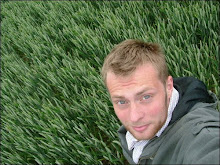It’s been hard to miss it this month – in cafés and libraries from Vancouver to Vienna, you’ll have seen them hunched over laptops or notepads. The Internet is resounding with their hopes, dreams…and occasional frustration as they battle on towards a final word count.
Over 250,000 people worldwide are participating in this year’s National Novel Writing Month (NaNoWriMo), which sets contestants the challenge of producing their own novel between 1st and 30th of November.
Among those thousands of dedicated souls are 50,000 under-18s who have signed up for NaNoWriMo’s Young Writers Program, setting their own word count goal for the month. The Program provides a wide range of resources and support for budding novelists and their classroom teachers – available here.
Chris Angotti, who runs the Young Writers Program for NaNoWriMo’s parent organization, joins us today for an interview on Books and Adventures.
What was the aim of setting up the Young Writers Program at NaNoWriMo? Was it hard to get schools on board initially?
The Young Writers Program was originally set up as a way to support teachers who wanted to implement NaNoWriMo in their classrooms. In the beginning, many of them were participants or friends of participants. So it wasn’t hard to get schools onboard; these folks were already aware of the potential of NaNo. Since then, we’ve done some outreach, but most of our expansion has been through word of mouth, with more and more young writers and educators excited by NaNo every year.
What has been the Program's greatest success to date?
I think our greatest success has been how much we’ve evolved. We’ve gone from a few classrooms to thousands. Our materials have gotten better, and we’re seeing the results of the hard work we’ve put in.
In terms of specific successes, I get those when I ask for stories from our participants. My greatest satisfaction is when I hear about kids—sometimes whole classes—who have gone from writing simple sentences to entire, involved novels. All because of the Young Writers Program.
What else does the YWP teach apart from creative writing skills? How does it affect students’ broader outlook?
I’m very proud of what we do for students’ self-esteem. In our surveys, almost 100% of educators agree that the program has made kids look at themselves as more capable and accomplished. They tell us that their students are ready to take on far more in life than just writing.
In addition, the program teaches time and project management skills—life lessons that are well conveyed through this challenge.
Is there a danger of pupils taking away a message of quantity not quality from the Young Writers’ Program? Are there educational benefits to a ‘quality not quantity’ approach?
We’ve always said that what NaNoWriMo helps with is a first draft. We definitely think it’s important that writers edit and revise their work. By the end of November, students are so attached to their novel that they want to do this. It’s no longer the chore it might be during standard grammar lessons. These young authors are proud of their work, and they want it to shine.
There’s a lot of pressure on teachers to fill an already packed school day with all the curriculum activities demanded by education authorities. How much time should they make for NaNoWriMo each day and why?
It’s really up to the individual teacher to determine how NaNo can work with his or her class. Some teachers simply introduce the challenge, and then students work on it individually at home. Others make it a major part of November, with time spent in class for planning, sharing, and editing. I think it depends most on students’ needs, and nobody knows that better than good teachers.
Have there been any memorable ‘Thank Goodness It’s Over’ parties held by the YWP groups?
We hear about people doing all kinds of stuff: prizes—quills, crowns, certificates—for writers; presenting students with finished copies of their novels; even just eating lots of pizza and celebrating. The TGIO party is an important part of the process—to acknowledge what students have completed and to make a special time to celebrate it.
One of my favorite parties is the one the Washington School for the Deaf throws every year. That’s a great inspiration.
What have been your own experiences as a ‘Wrimo’?
This is actually my first November as YWP Director, and my first year doing NaNoWriMo. So far, I’ve been keeping up the best I can with my word count. It’s not as hard as people think! The support I’ve gotten from the office, and from my local region, has been invaluable. I love it, and I’m happy to be forced to write. I know that even if my book is not perfect (or even close to it), I’ll have accomplished something that most others haven’t.
What are your favourite books?
I like most anything by Fitzgerald or Hemingway. They’re my go-to authors. Two more recent books that I really love are Jim the Boy by Tony Earley and Underworld by Don DeLillo. Each is epic and evocative in its own way—one more simple and restrained, the other sprawling. I’m always reading, though, and have too many favorites to list.
You can find out more about NaNoWriMo’s Young Writers Program at http://ywp.nanowrimo.org/
Subscribe to:
Post Comments (Atom)

No comments:
Post a Comment